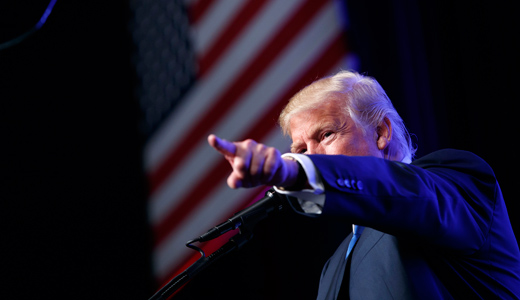
Republican Party presidential candidate Donald Trump has reversed his previous position on U.S. relations with Cuba and is now saying that if elected he would reverse President Obama’s epochal opening to the socialist island nation.
In a speech in Miami, Florida on Friday September 16, addressing an audience that contained hard line, anti-communist Cuban exiles, Trump said:
“We are also going to stand with the Cuban people in their fight against communist oppression. The president’s one-sided deal for Cuba benefits only the Castro regime. But all the concessions that Barack Obama has granted the Castro regime were done through executive order, which means the next president can reverse them-and that is what I will do, unless the Castro regime meets our demands. Those demands will include religious and political freedom for the Cuban people”.
He then took a swipe at Venezuela, which he claims has been “run into the ground by socialists”. “The next president of the United States must stand in solidarity with all people oppressed in our hemisphere, and I will stand with the oppressed people of Venezuela yearning to be free”.
This new stance on Cuba appears to reverse an earlier, vaguely stated position that he was “fine” with ending the U.S. economic blockade of Cuba and that 50 years was enough. At that time, Trump created a stir of worry among some on the right who thought he might be going soft on the Cuba issue.
Why the sudden change? Last week, new election polling suggested that Trump is narrowing the gap with Democratic Party candidate Hillary Clinton, and that Florida’s 29 electoral votes may now be reachable for him. This is a big prize; the number of Florida electoral votes ties with New York and only California, with 55 and Texas, with 58 have more. To win straight-up, Clinton or Trump will have to capture 270 electoral votes. Although there are a number of third party candidates, it does not look at this point as if any of them will win the electoral votes of a single state.
For many years, the weight of Florida’s electoral votes, and the political strength of anti-Castro Cuban exiles in Florida politics were one of the major obstacles to achieving any changes in U.S. policies toward Cuba. In recent presidential election cycles, however, the power of the right wing exile lobby has been weakening as younger Cuban Americans develop more nuanced and even positive attitudes toward their ancestral homeland, and as other Latin American national groups which do not share the hard line attitudes of first-generation Cuban exiles, have entered the state in greater numbers. Nationally, polls show that Obama’s opening to Cuba enjoys wide popular support, in spite of decades of ferocious anti-Cuba propaganda.
However, powerful Republican political figures in the South Florida Cuban exile community, including Senator Marco Rubio, Congressman Mario Diaz-Balart and Congresswoman Ileana Ros-Lehtinen, remain as hard line on the Cuba issue as ever. The anti-communist propaganda coming out of that sector is also aimed at Venezuela and other countries with even slightly left of center governments in the Americas. These political power brokers may no longer represent the majority of Cuban Americans, but they can move votes and campaign contributions through the political machinery they control.
The reasons Trump gives for switching to a hard line on Cuba make little sense. He talked about religious freedom, but people who are familiar with Cuban realities do not claim that religious worship is restricted or persecuted there. Complaints by some religious individuals focus on the fact that divorce is legal in Cuba and that the government’s universally available health services provide birth control and abortion. Also, Cuba has not allowed the existence of private, church run elementary and secondary schools alongside public schools. But all this is nothing like the fierce persecution of religious minorities that goes on in some states that are U.S. strategic allies, such as Saudi Arabia. Trump also ignores, as all of the Right does, the mechanisms of mass popular participation in government that exist in Cuba (and Venezuela) and the many advances that Cuba, especially, has made in health care, education, women’s rights, minority rights, solidarity with poorer countries worldwide, and other fronts too numerous to mention here.
Trump’s decision to “demagogue” the Cuba issue, along with the new polls which show him catching up to Clinton with only seven weeks until the elections, should sound the alarm for all of us who want the United States to have a more peaceful and cooperative foreign policy, that recognizes the right of other countries to choose their own governments. Hillary Clinton has said she will maintain the Obama opening to Cuba.
Photo: Trump speaks during a campaign rally at the James L. Knight Center in Miami, Sept. 16. The GOP-Cuban alliance is softening, and Trump could speed the process. Evan Vucci | AP









Comments